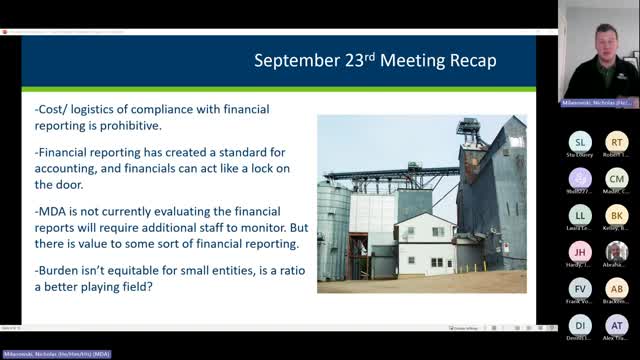State Financial Reporting Comparison Reveals Variances Among Michigan, Minnesota and Others
November 16, 2023 | Agriculture, Department of , Agencies, Boards, & Commissions, Executive, Minnesota
This article was created by AI summarizing key points discussed. AI makes mistakes, so for full details and context, please refer to the video of the full meeting. Please report any errors so we can fix them. Report an error »

The second meeting of the Grain Advisory Group, held on November 16, 2023, by the Minnesota Department of Agriculture, focused on financial reporting practices among neighboring states and the implications for Minnesota's grain industry. The meeting began with a review of previous discussions and a request for insights into how other states manage financial reporting for grain businesses.
Participants examined the financial reporting requirements in states such as Michigan, North Dakota, South Dakota, and Wisconsin. Most of these states mandate some form of financial reporting, with North Dakota being the exception, allowing internal reporting instead of audits. Minnesota's current regulations exempt businesses from financial reporting if they make cash purchases upon delivery, a practice that aligns with some neighboring states.
The group noted that South Dakota requires quarterly reviews, while Wisconsin has specific thresholds based on bushels purchased annually. Michigan mandates a net worth of $100,000 for businesses, with bonding requirements for those that do not meet this threshold. Minnesota also requires new entities to hold a bond of $100,000, similar to practices in other states.
Discussion turned to the evaluation methods used by states to assess financial health. While some states have clear legal guidelines, others adopt a more flexible approach. The group highlighted that a current ratio of 1:1 is often considered an industry standard, although practices vary significantly.
A notable point of discussion was South Carolina's approach, which allows businesses without financial statements to file a bond instead. This method was seen as a potential model for Minnesota, emphasizing the relationship between bonding and financial viability.
The meeting concluded with a proposal from a member to consider raising bond amounts as an alternative to requiring audited financial statements, suggesting that the cost of bonds could be more manageable for businesses compared to the expenses associated with audits.
Overall, the meeting underscored the need for Minnesota to evaluate its financial reporting and bonding requirements in light of practices in neighboring states, aiming to balance regulatory oversight with the financial realities faced by grain businesses. Further discussions and follow-up actions are anticipated as the group continues to refine its recommendations.
Participants examined the financial reporting requirements in states such as Michigan, North Dakota, South Dakota, and Wisconsin. Most of these states mandate some form of financial reporting, with North Dakota being the exception, allowing internal reporting instead of audits. Minnesota's current regulations exempt businesses from financial reporting if they make cash purchases upon delivery, a practice that aligns with some neighboring states.
The group noted that South Dakota requires quarterly reviews, while Wisconsin has specific thresholds based on bushels purchased annually. Michigan mandates a net worth of $100,000 for businesses, with bonding requirements for those that do not meet this threshold. Minnesota also requires new entities to hold a bond of $100,000, similar to practices in other states.
Discussion turned to the evaluation methods used by states to assess financial health. While some states have clear legal guidelines, others adopt a more flexible approach. The group highlighted that a current ratio of 1:1 is often considered an industry standard, although practices vary significantly.
A notable point of discussion was South Carolina's approach, which allows businesses without financial statements to file a bond instead. This method was seen as a potential model for Minnesota, emphasizing the relationship between bonding and financial viability.
The meeting concluded with a proposal from a member to consider raising bond amounts as an alternative to requiring audited financial statements, suggesting that the cost of bonds could be more manageable for businesses compared to the expenses associated with audits.
Overall, the meeting underscored the need for Minnesota to evaluate its financial reporting and bonding requirements in light of practices in neighboring states, aiming to balance regulatory oversight with the financial realities faced by grain businesses. Further discussions and follow-up actions are anticipated as the group continues to refine its recommendations.
View the Full Meeting & All Its Details
This article offers just a summary. Unlock complete video, transcripts, and insights as a Founder Member.
✓
Watch full, unedited meeting videos
✓
Search every word spoken in unlimited transcripts
✓
AI summaries & real-time alerts (all government levels)
✓
Permanent access to expanding government content
30-day money-back guarantee

